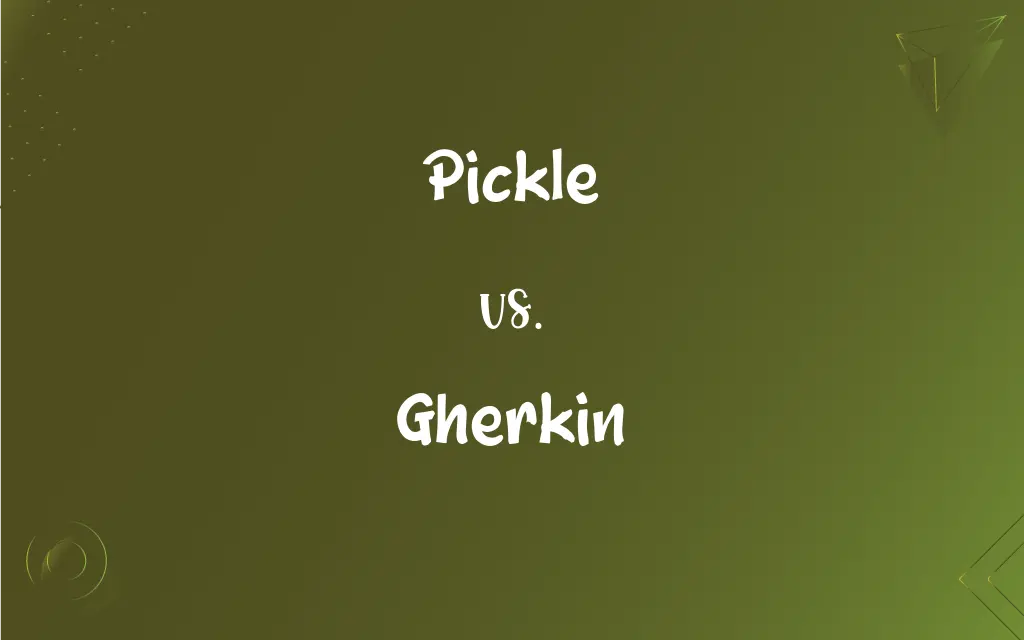Pickle vs. Gherkin: What's the Difference?
By Aimie Carlson & Harlon Moss || Updated on June 30, 2024
A pickle is any vegetable preserved in vinegar or brine, while a gherkin is a small cucumber specifically pickled.

Key Differences
A pickle refers to a vegetable, often a cucumber but not exclusively, that has been preserved in a solution like vinegar or brine. On the other hand, a gherkin is a specific type of small cucumber that is pickled.
The term "pickle" can encompass a wide range of vegetables, from cucumbers to carrots, preserved in a brine. The gherkin is exclusively a cucumber and is often recognized by its small size and bumpy exterior.
While pickles can vary greatly in flavor, texture, and size based on the vegetable and preparation method used, gherkins are usually characterized by a crunchy texture and a tangy flavor due to the traditional pickling process.
Pickles are a staple in many cuisines around the world, each having their distinct method and flavor profiles. Gherkins, being a type of pickle, are especially popular in European and American cuisines.
In some regions, the words "pickle" and "gherkin" might be used interchangeably, especially where the primary vegetable pickled is the cucumber. However, it's essential to recognize that while all gherkins are pickles, not all pickles are gherkins.
ADVERTISEMENT
Comparison Chart
Definition
A vegetable preserved in vinegar or brine
A small cucumber pickled
Varieties
Can be made from various vegetables
Made exclusively from a specific type of cucumber
Size
Can vary in size
Typically small
Flavor Profile
Can have diverse flavors based on the vegetable and brine
Traditionally tangy and crunchy
Universality
Term used globally with variations in meaning
Especially popular in European and American cuisines
ADVERTISEMENT
Pickle and Gherkin Definitions
Pickle
A vegetable preserved in a vinegar or brine solution.
She added a slice of pickle to her sandwich.
Gherkin
Recognized by its bumpy exterior and small size.
The gherkin stood out among the other pickles due to its texture.
Pickle
A challenging situation or dilemma.
He found himself in a pickle when he forgot his presentation.
Gherkin
A pickle made from a young cucumber.
He enjoyed the tangy taste of the gherkin.
Pickle
The solution used to preserve foods, typically salty and acidic.
The eggs were stored in a spicy pickle for added flavor.
Gherkin
Commonly used in European and American dishes.
Gherkin is a favorite topping on British sandwiches.
Pickle
A term used to describe foods that have undergone pickling.
The store had a variety of pickle products on the shelf.
Gherkin
A small cucumber used for pickling.
She topped her salad with sliced gherkins.
Pickle
A favorite snack or accompaniment in various cuisines.
A burger isn't complete without a pickle on the side.
Gherkin
A specific type of pickle with a distinct flavor profile.
She preferred the bite-sized crunch of a gherkin over regular pickles.
Pickle
An edible product, such as a cucumber, that has been preserved and flavored in a solution of brine or vinegar.
Gherkin
A small cucumber, especially one used for pickling.
Pickle
A solution of brine or vinegar, often spiced, for preserving and flavoring food.
Gherkin
A pickle made from such a fruit.
FAQs
What is a pickle?
A pickle is any vegetable preserved in vinegar or brine.
What is a gherkin?
A gherkin is a small cucumber that has been pickled.
Are all gherkins pickles?
Yes, all gherkins are pickles, but not all pickles are gherkins.
What does it mean to be "in a pickle"?
"In a pickle" is an idiom meaning to be in a challenging situation or dilemma.
Is the flavor of a pickle always the same?
No, pickles can have diverse flavors based on the vegetable and pickling solution used.
Do gherkins taste different from other pickles?
Gherkins have a distinct, typically tangy flavor, but taste can vary based on the pickling process.
What gives the gherkin its tangy flavor?
The tangy flavor typically comes from the vinegar and spices used in the pickling process.
Can a pickle be made from vegetables other than cucumbers?
Yes, pickles can be made from a variety of vegetables, not just cucumbers.
Are gherkins always small?
Typically, gherkins are small, characterized by their bumpy exterior.
What's the primary difference between a pickle and a gherkin?
The primary difference is that a pickle can be any pickled vegetable, while a gherkin is specifically a pickled small cucumber.
Can you use the brine from a gherkin jar for other purposes?
Yes, gherkin brine can be used in dressings, marinades, or even in cocktails.
Are gherkins only popular in Europe and America?
While gherkins are especially popular in European and American cuisines, they can be found elsewhere too.
Do pickles offer any health benefits?
Yes, pickles can be a source of probiotics and vitamins, though it varies by preparation.
Why are gherkins typically crunchy?
Gherkins are crunchy due to their young age at harvest and the pickling process they undergo.
Can you make pickles or gherkins at home?
Absolutely! Many people make homemade pickles and gherkins using fresh vegetables, vinegar, salt, and spices.
Can you eat the skin of the gherkin?
Yes, the skin of the gherkin is edible and is usually consumed.
Is it true that pickles can help with muscle cramps?
Some people believe pickle juice can help with muscle cramps, though scientific evidence is limited.
Are pickles and gherkins always salty?
While many are salty due to the brine, there are also sweet pickles and gherkins available.
Is there a difference between a dill pickle and a gherkin?
Yes, a dill pickle is flavored with dill and can be made from larger cucumbers, while a gherkin is a specific type of small cucumber.
How long can you store pickles or gherkins?
When stored properly in a cool place, sealed pickles and gherkins can last up to a year or more.
About Author
Written by
Aimie CarlsonAimie Carlson, holding a master's degree in English literature, is a fervent English language enthusiast. She lends her writing talents to Difference Wiki, a prominent website that specializes in comparisons, offering readers insightful analyses that both captivate and inform.
Co-written by
Harlon MossHarlon is a seasoned quality moderator and accomplished content writer for Difference Wiki. An alumnus of the prestigious University of California, he earned his degree in Computer Science. Leveraging his academic background, Harlon brings a meticulous and informed perspective to his work, ensuring content accuracy and excellence.































































